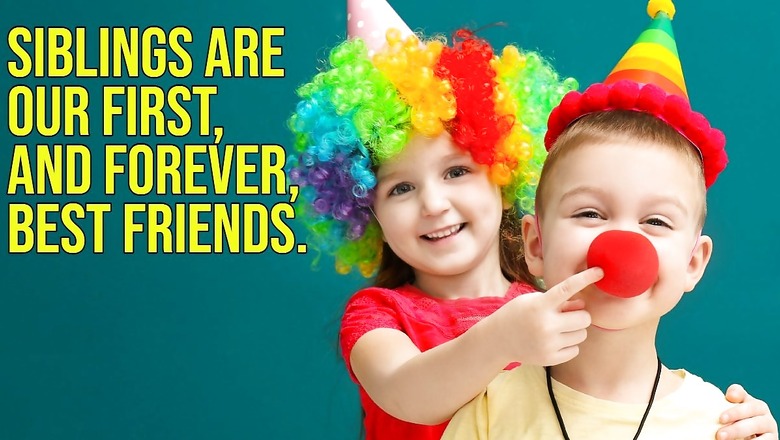
views
Sibling relationships, which are often the longest-lasting ties in our lives, play an important but often overlooked role in forming our identity and sense of belonging. While parental influence is well understood, the impact of brothers and sisters on our personal development warrants further investigation. Sibling interactions influence our self-concept and sentiments of familial closeness, providing insights that go beyond common beliefs.
Dr Chandni Tugnait, MD (A.M) Psychotherapist, Life Alchemist, Coach & Healer, Founder & Director, Gateway of Healing helps us take a look at some of the ways sibling relationships affect our lives:
- The sibling as a social laboratorySibling connections are our first social experiences outside of parental interactions. This “domestic laboratory” allows you to experiment with different social roles, conflict resolution techniques, and emotional displays. The abilities learned here frequently transfer into broader social contexts, influencing how we handle relationships throughout our lives.
- Identity formation through differentiationSiblings often unintentionally differentiate themselves, carving out a unique niche within the family to form their identity. This tendency, known as “de-identification,” can result in the development of opposing personality traits and interests, considerably altering individual identity formation.
- The shared history effectSiblings have a shared history that distinguishes them from friends and romantic partners. This shared background of events fosters a unique link and understanding, contributing to a profound sense of belonging that endures even throughout conflicts or times of separation.
- Sibling order dynamicsBirth order has an impact on personality development and family duties; however, it is not deterministic. Firstborns are more likely to be leaders, but later-borns may develop negotiation and humour abilities. These patterns can influence how people perceive themselves and their roles in family and social organisations.
- Emotional regulation learningSibling relationships offer a safe space for learning emotional management. The high emotions experienced in sibling interactions, ranging from antagonism to affection, provide opportunities to build emotional intelligence and coping skills that will influence future relationships.
- Self-reflection catalystSiblings can act as a catalyst for self-reflection, revealing elements of ourselves we may not be aware of. This can encourage self-reflection and personal development, resulting in a more complex self-understanding.
- Support system dynamicsThe sibling relationship often evolves into a unique support system in adulthood, providing a sense of security and belonging that complements other relationships.
- Legacy and continuitySiblings contribute to our sense of familial legacy and continuity, connecting us to our past and future in ways that shape our understanding of our place in the family narrative.
The impact of siblings on our identity and sense of belonging is significant and diverse. Siblings influence who we are by serving as our first social peers and influencing our self-perception through distinction and shared experiences. This relationship, distinguished by its durability and shared history, provides a unique backdrop for personal development that goes well beyond childhood.
As we navigate the challenges of identity creation and seek a sense of belonging, understanding the importance of sibling relationships can provide vital insights. Whether via conflict, collaboration, or just shared existence, our siblings make subtle and deep contributions to the tapestry of our own histories. Recognizing and understanding its influence allows us to have greater respect for these lifelong connections and their role in shaping our journey through life.













Comments
0 comment